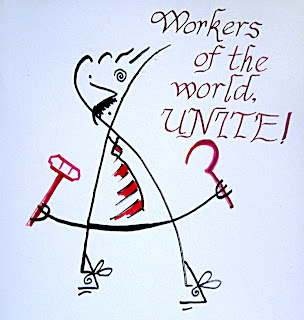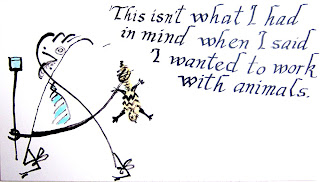I would post my Holy Saturday sermon (such as it was) but mostly it was me talking about why we shouldn't be having one at all, shouldn't be singing songs - not yet. Holy Saturday is when we contemplate the absence of God. Yes, we have the promised Light of the resurrection, but it's not there yet. I think we have a desire to skip the tomb, go straight to Easter, and avoid thinking about the absence of God. Anyhow, that's it in a nutshell, and it's not particularly timely on the Tuesday after Easter anyhow.
So let me tell you a story.
Once upon a time there was a man - scratch that, there was a boy - who didn't contemplate failure. He applied to college with no sense that he wouldn't get in, no sense that there wouldn't be money to pay. And lo, he got in, and lo, there was money. Then came struggle - relationships, academics - but he triumphed over adversity. So far, so good.
This story would be tedious if I kept going like this (and maybe you already find it tedious - but I've included a cartoon). So I'll skip the details of the setbacks, because what I want to emphasize is the background is optimism, if not outright idealism (in the non-philosophical sense). So what happens when a basically optimistic person hits a wall?
That could just be a rhetorical question, but it's not. I've told bits and pieces of my story on this blog, but I suspect that most of my regular readers know there was a hope for an academic career, among other things, that never materialized. I worked as a house painter, I worked as a law librarian, I tried to figure out what I wanted to do when I grew up. (For those of you who doubt that I actually want to grow up, I will refer you to my autobiographical song, "Hey Blue Fairy.") At one point, further back than most people know, I had this idea that I could be a pastoral counselor or something like that; several years (and a significant shift in religious understanding) later, I was in seminary, and hoped that my life was getting back on track. (I started this blog in seminary, and even if many of my posts were really vague, I've written extensively about what was happening in my life at that time: I'm not going to cover that ground again today.)
At that point - five years ago! - everything seemed to be heading in the right direction: my book was coming out, I was in what seemed like a really healthy relationship, I was getting actual job interviews for jobs that I was excited about! Finally, finally, finally, things were falling into place.
Except of course they didn't. And as in a story by Kafka (he did write things other than the Metamorphosis, but of course that's the one I mean) - things went from bad to worse, and while I traveled out to Portland in search of a job, the entire economy collapsed. So, what happens when a basically optimistic person hits a wall?
Have I been a happy, optimistic person, full of energy and able to bring my attention to those around me who deserve it (including but not limited to my children - or my friend, Jack Good)? Nope. I've felt stuck, unable to get any traction anywhere, for years - YEARS! It's really sucked, and I've (I almost wrote "probably," but strike that) been a drag on the people around me. That's what happens when a basically optimistic person hits a wall.
What's my story now? Well, I'm still not quite where I'd like to be; but I'm finally doing the work I started thinking about twelve years ago. I can see a path forward; a huge part of that is seeing employment opportunities around the corner, if not yet in-hand. I'm sleeping better; I have more energy than I did. I still feel bad about not being fully present to Jack, and to others around me in the past few years. But lately I've been able to actually pay attention to people around me - Steve and Jeffrey, and Paul, and others. And that's been nice. I feel like I'm starting to get back to who I was.
It's still cold outside, but the sun is shining and it seems like spring is finally on its way.
Richmond Industrial Fire
2 years ago














































